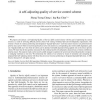Free Online Productivity Tools
i2Speak
i2Symbol
i2OCR
iTex2Img
iWeb2Print
iWeb2Shot
i2Type
iPdf2Split
iPdf2Merge
i2Bopomofo
i2Arabic
i2Style
i2Image
i2PDF
iLatex2Rtf
Sci2ools
IPL
2002
2002
A self-adjusting quality of service control scheme
We propose and analyze a self-adjusting Quality of Service (QoS) control scheme with the goal of optimizing the system reward as a result of servicing different priority clients with varying workload, QoS and reward/penalty requirements. Our scheme is based on resource partitioning and designated "degrade QoS areas" such that system resources are partitioned into priority areas each of which is reserved specifically to serve only clients in a corresponding class with no QoS degradation, plus one "degraded QoS area" into which all clients can be admitted with QoS adjustment being applied only to the lowest priority clients. We show that the best partition is dictated by the workload and the reward/penalty characteristics of clients in difference priority classes. The analysis results can be used by a QoS manager to optimize the system total reward dynamically in response to changing workloads at run time. We demonstrate the validity of our scheme by means of simulat...
| Added | 22 Dec 2010 |
| Updated | 22 Dec 2010 |
| Type | Journal |
| Year | 2002 |
| Where | IPL |
| Authors | Sheng-Tzong Cheng, Ing-Ray Chen |
Comments (0)

